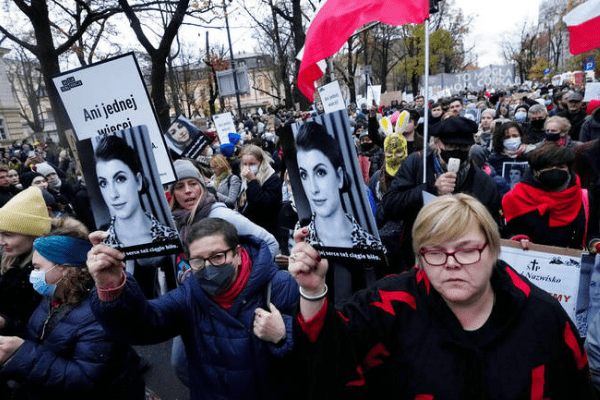Protests against Poland’s strict anti-abortion laws reignited over the weekend after a 30-year-old, pregnant woman died from septicaemia when she was left untreated inside a hospital.
The victim, known only as Izabela, texted her mother the evening before her death while she was in a hospital in south-west Poland.
“For now, because of the abortion law, I have to stay in bed and they can’t do anything,” she wrote.
“Alternatively, they will wait for the baby to die or for something to start happening. If it doesn’t, then great, I can expect sepsis.”
“My fever is increasing. I hope that I don’t have septicaemia, otherwise I will not make it.”
“It’s dreadful. And I have to wait.”
Izabela died the following morning, on September 22, along with her 22-week-old foetus. She became the first victim in the country of the near-total ban on abortion.
Her family have told media that staff at the hospital refused her life-saving health treatment as they were frightened of breaking the country’s strict abortion laws which were tightened in January this year — when the procedure was allowed only in cases of rape or incest or when the pregnancy threatens the mother’s life.
Tens of thousands of demonstrators took to the streets of Warsaw and several other Polish cities, demanding the Constitutional Court, which last year accorded with the populist right-wing government to change their rule that terminations over foetal defects were unconstitutional.
Jolanta Budzowska, the lawyer representing Izabela’s family, told The Guardian the doctors responsible for Izabela notified her husband the cause of death as caused pulmonary embolism, saying, “sometimes it happens.”
The initial autopsy however revealed that she had died of septic shock.
Budzowska added that after “the tightening of the abortion law in Poland due to the 2020 ruling of the constitutional tribunal, there remains only one ground for an abortion which would have applied in this case: endangerment of the life or health of the mother.”
“However, it is hard for the doctors to apply this in practice,” she said.
“They do not know if they make the right decision when this real danger occurs. If they carry out an abortion too early and the prosecutors then decide that there was no danger to the mother, they can face up to three years in prison.”
In the capital Warsaw, thousands of demonstrators shouted “Not one more,” and “Her heart was beating too,” congregating outside the Constitutional Court and the Ministry of Health.
Izabela’s family released a statement accusing the doctors responsible for Izabela of taking “a wait-and-see attitude,” which it attributed to “the rules in effect limiting the possibility of a legal abortion”.
Two doctors at the hospital in Pszczyna, were Izabela died, have since been suspended and the town’s prosecutors have launched an inquiry, according to Reuters.
But the nationalist government, which controls the country of more than 37 million, is claiming that Izabela’s death had nothing to do with the strict abortion laws.
Rights groups across the country argue that thousands of women have asked for their help to get abortions since October last year, when Poland’s Constitutional Tribunal ruled that abortion on grounds of “severe and irreversible foetal defect or incurable illness that threatens the foetus’ life” was unconstitutional.
A collection rights groups, including International Campaign for Women’s Right to Safe Abortion, Amnesty International, International Planned Parenthood Federation-European Network, and Human Rights Watch said in October that as a result of the court ruling “women, girls, and all pregnant people have faced extreme barriers to accessing legal abortions”.
“The Constitutional Tribunal ruling is causing incalculable harm to women and girls – especially those who are poor, live in rural areas, or are marginalised,” Urszula Grycuk said. “The dignity, freedom and health of pregnant people are compromised because their own government is denying them access to essential reproductive health care.”
Grycuk is the international advocacy coordinator at the Federation for Women and Family Planning (Federa) in Poland, a group which formed part of the collective urging for the law to be changed.
Another rights group, Abortion Without Borders, reported 17,000 women in Poland had contacted them in the six months after the new laws to help them access abortion. They also said they continue to receive over 800 calls a month, appealing for assistance.
Photo: AP



